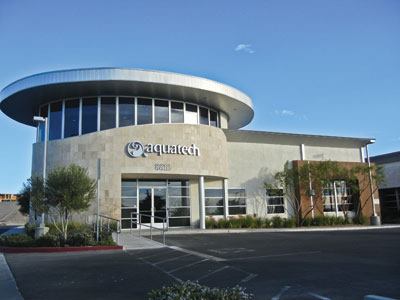In its 50th anniversary year, buying group Aquatech Corp. has relocated its headquarters from Southern California to Las Vegas, utilizing a detailed, point-by-point plan.
The group originated in Arizona in 1962 and moved to Orange County, Calif., in 1982. After three decades, officials decided to escape the Golden State’s notoriously high taxes and real estate prices.
“Aquatech is a member-owned organization, so if the corporation saves money, it’s better for the members,” said Rob Morgan, president of Dallas-based Sunbelt Pools, who was involved in the relocation planning. “Since the majority of our members are not in California, it made no sense to continue paying California taxes, fees and prices.”
The organization also had considered Texas, Florida and Arizona before deciding on Las Vegas.
“It has all the economic advantages,” said Aquatech President/CEO Jeff Fausett. “Nevada’s tax position is excellent; its airlift in and out of Las Vegas is the best in the country. You can get anywhere on a direct flight, which is a huge advantage for us to interact with our member base, and for our vendor base to come visit us.”
With Nevada properties selling at approximately 50 percent of the price for comparable lots in Southern California, Aquatech was able to pay cash for a property nearly 30 percent larger. The new space was organized in part to house more educational sessions, with one large room and two smaller conference areas.
The new hometown proved strategic on a personnel level as well because the organization hoped to retain as much of its staff as possible. A year before the move, Aquatech notified its employees, inviting all 30 to relocate. Exactly half accepted, including management and most of the IT staff. The others, largely customer-service and accounting personnel, had to be replaced.
As the group sought new hires, one of Nevada’s benefits came into stark relief: When Aquatech participated in a job fair, about 450 people applied for 15 open slots. “We weren’t just finding people on the bottom end of the spectrum,” Fausett said. “We were getting lawyers, MBAs, engineers and degreed accountants, all the way across the scale of experience. So there was a tremendous pool of great employees to pick from.”
With such strong candidates on the market, Aquatech could bring on employees with more qualifications than before. “We had no degreed staff in the accounting department [in California],” Fausett said. “They’re all degreed here now. In California, if you wanted to hire someone with an accounting degree … it would be unaffordable.”
While Fausett is quick to say his California staff was more than capable, he hopes the new crew will be able to help develop systems to build upon and improve the company’s performance.
The Nevada personnel were hired by spring and Aquatech paid to train them in California, with customer-service personnel training throughout the busy season. Las Vegas-based employees commuted to the California office during the week to work alongside their predecessors. “People on the California side were starting to leave gradually — a person a month here, a couple of people there — but more or less, we were running with double staff,” Fausett said.
The organization paid for employees to fly to California, stay in hotel rooms during the work week, and travel home for the weekends. Fausett estimates this cost $300,000 to $400,000. “But when you consider that you’re training people and you were also creating experience in the season, so it was worth the investment,” Fausett said.
Because the existing staff had been given the option of staying, morale remained high during the training period.
Management also arranged more team-building lunches to not only integrate new employees into the corporate culture, but to show the previous staff their appreciation.
The organization devised a strategy to minimize disruption, moving employees from California to Nevada in three phases, one department at a time. The information technology system was moved first so it could be firmly in place before the rest of the company followed. The organization’s most important function is accepting and fulfilling orders, Fausett said, so that capability needed to be preserved with the least disruption.
Aquatech officials chose to virtualize their computer system, or put it on “the cloud,” rather than hosting a server platform. “[This creates] a more efficient system with higher reliability and redundancy,” Fausett explained. “The servers will never be down in a virtual environment.”
Next, Aquatech sent the accounting department to its new home. The organization figured that because accounting tasks don’t require an in-depth understanding of the pool and spa industry and its products, this staff could more easily step in and replace their predecessors.
The customer service department was the last to move because those employees would need to learn more about the industry, its products and Aquatech members. Keeping this function in California longer gave the new employees more time to work in tandem with their predecessors during the busy season. When things slowed down in the fall, this final piece of the puzzle was put in place.
This was the third time in his career that Fausett has relocated a company. The key, he said, is to plan and manage every small detail. “From a CEO’s standpoint,” he said, “if there’s one valuable lesson in that, it’s that you have to have a very strong person in your employ who’s helping you plan it on a detailed level.”




